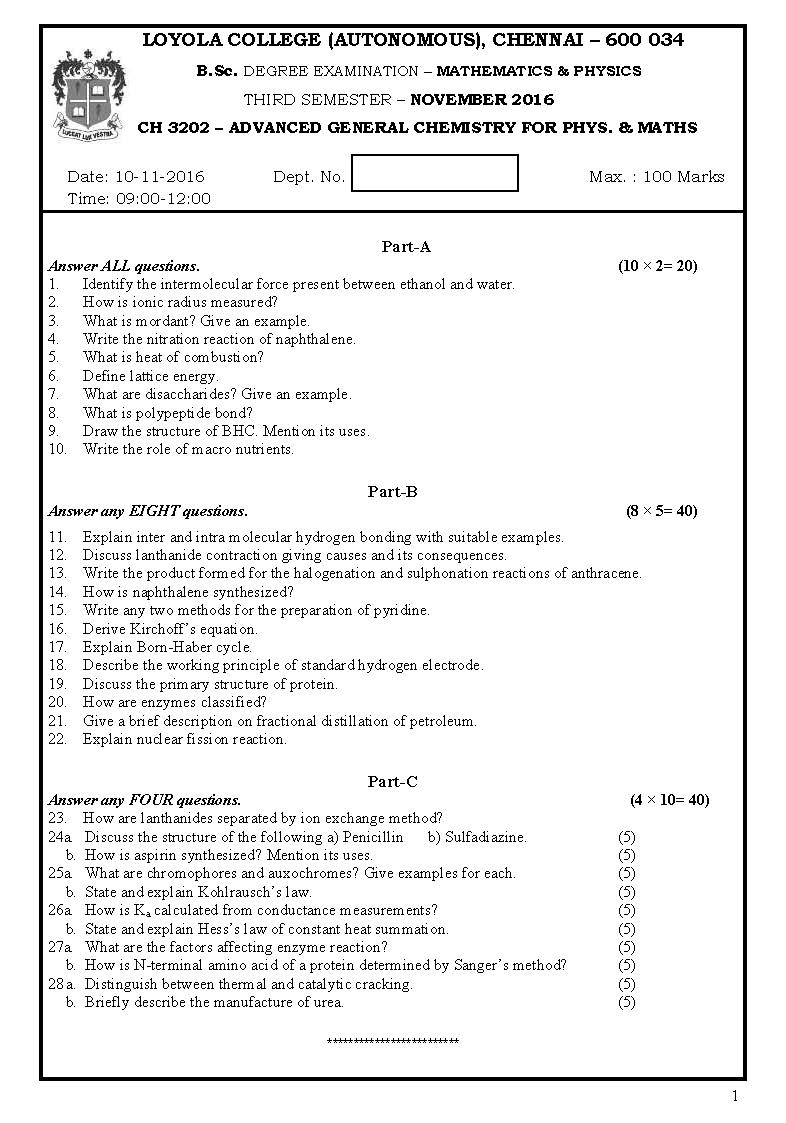Loyola College Advanced General Chemistry For Phys. & Maths Question Papers Download
“Loyola College B.Sc. Chemistry Nov 2012 Advanced General Chemistry For Phys. & Maths Question Paper PDF Download”
LOYOLA COLLEGE (AUTONOMOUS), CHENNAI – 600 034
B.Sc. DEGREE EXAMINATION – MATHS & PHYSICS
THIRD SEMESTER – NOVEMBER 2012
CH 3202/3200 – ADVANCED GENERAL CHEMISTRY FOR PHYS. & MATHS
Date : 09/11/2012 Dept. No. Max. : 100 Marks
Time : 9:00 – 12:00
PART-A
Answer ALL questions: (10 × 2 = 20)
- Mention any two methods to detect hydrogen bonding.
- Account for “Water having low molecular weight boils at a high temperature than ethyl alcohol”
- Write the Reimer-Tiemann reaction of pyrrole.
- Give a method for the preparation of furan.
- Write the mathematical equation of first law of thermodynamics. Mention the terms involved.
- Define lattice energy.
- Draw the structure fructose.
- What is polypeptide bond?
- Draw the structure of BHC. Mention its uses.
- List any two uses of radioisotopes.
PART-B
Answer any EIGHT questions: (8 × 5 = 40)
- o-nitro phenol is steam volatile and the para isomer is not volatile. Explain.
- a) Give reason “Ethanoic acid in benzene have a relative molecular mass twice as
large as expected” (3)
- b) Why does ice float? (2)
- How is malachite green prepared? Give its uses.
- Explain the Haworth’s synthesis of naphthalene.
- Write any three methods for the preparation of pyridine?
- Derive Kirchoff’s equation.
- Describe the working principle of Calomel electrode.
- Define the following with an example
- a) heat of formation b) neutralization
- How are enzymes classified?
- Discuss the secondary structure of protein.
- Discuss the following:
- a) thermal cracking b) catalytic cracking
- Explain nuclear fission reaction.
PART-C
Answer any FOUR questions: (4 × 10 = 40)
- a) Write the consequences of lanthanide contraction. (6)
- b) Explain the different types of hydrogen bonding with suitable examples. (4)
- a) Give any two methods of synthesis of pyrrole. (5)
- b) What are chromophore and auxochromes? Give examples for each. (5)
- a )Write the chlorination and nitration reaction of anthracene. (5)
b)State and explain Kohlrausch’s law. (5)
- a) Explain Born-Haber cycle with an example. (5)
- b) Explain strong acid-weak base titration by conductometric method. (5)
27.a) What are the factors affecting enzyme reaction? (5)
- b) Explain the lock and key mechanism of enzymes. (5)
- a) Give a brief description on fractional distillation of petroleum. (5)
b)Write short notes on renewable energy. (5)
